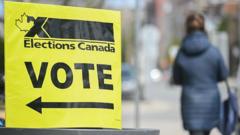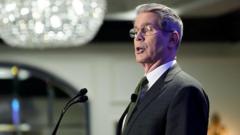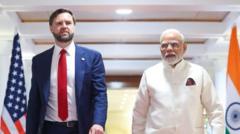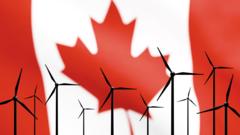With election day approaching, Canadian voters show unprecedented enthusiasm as early polling statistics reveal a 25% increase in participation compared to the last federal elections.
Record Early Voter Turnout in Canada: 7.3 Million Ballots Cast

Record Early Voter Turnout in Canada: 7.3 Million Ballots Cast
Canada witnesses historic participation as 7.3 million advance ballots are cast, setting a new early voting record.
More than 7 million Canadians have made their voices heard ahead of election day, as 7.3 million ballots were cast during the early voting period, marking a historic turnout, according to Elections Canada. The advance polling took place over four days during the Easter weekend, with lines forming outside voting stations and two million ballots cast on the first day alone.
With less than a week remaining until the crucial election on April 28, federal leaders are ramping up their campaign efforts. The voters will decide which political party will take the reins amidst ongoing trade tensions with the United States and remarks from President Donald Trump about possibly incorporating Canada as the 51st state.
Election data indicates that around a quarter of eligible Canadian voters participated in the early vote, a significant increase from the 5.8 million who voted early in 2021. Additionally, mail-in voting has become increasingly popular, with 754,000 Canadians returning their special ballots, up from 660,000 last time.
Current polling indicates that the Liberal party leads the Conservative party by 5 percentage points, as campaigning reaches its climax. Liberal leader Mark Carney has highlighted his party's capability to tackle Trump's proposed tariffs, stating that his opponent, Conservative leader Pierre Poilievre, lacks an effective strategy against the US president's aggressive trade policies.
The tariffs imposed by the US include a 25% levy on various goods from Canada, causing significant disruption to the Canadian auto industry and resulting in thousands of layoffs. A Liberal victory would signify a dramatic comeback for the party, which faced a steep decline in popularity following Justin Trudeau's departure earlier this year.
The Conservative party has centered their campaign around the call for change after nearly a decade of Liberal governance. Poilievre has addressed issues like housing affordability, rising crime rates, and escalating living costs, urging the government's fiscal accountability.
Meanwhile, the Bloc Quebecois is expected to secure third place, advocating for Quebec's interests, while the New Democratic Party finds itself in a less favorable fourth position. As the election day approaches, all eyes are on Canada's evolving political landscape.





















